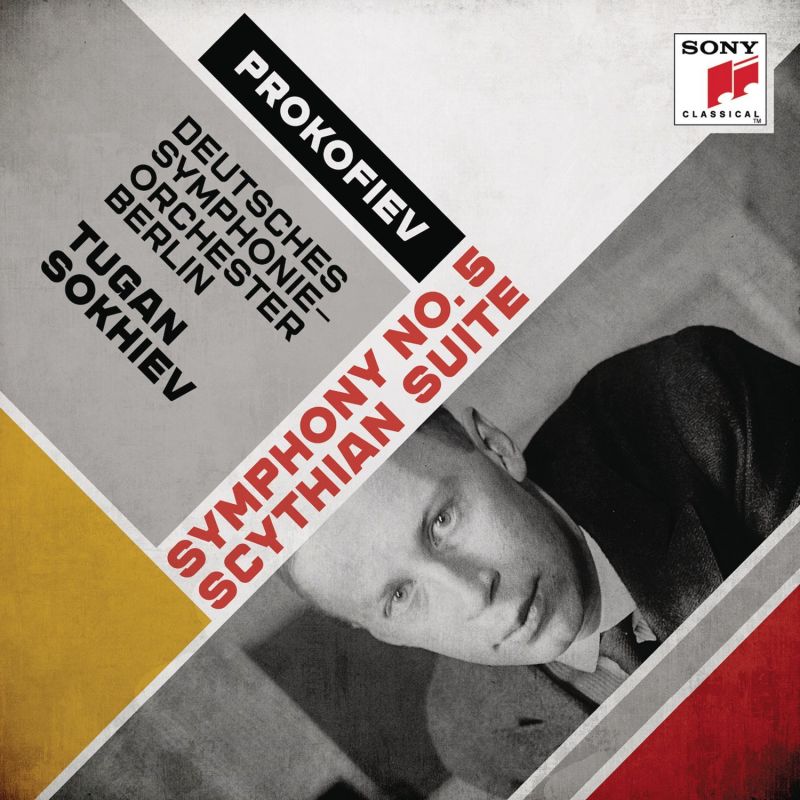PROKOFIEV Symphony No 5
View record and artist detailsRecord and Artist Details
Composer or Director: Sergey Prokofiev
Genre:
Orchestral
Label: Sony Classical
Magazine Review Date: 06/2016
Media Format: CD or Download
Media Runtime: 68
Mastering:
DDD
Catalogue Number: 88875 18515-2

Tracks:
| Composition | Artist Credit |
|---|---|
| Symphony No. 5 |
Sergey Prokofiev, Composer
Berlin Deutsches Symphony Orchestra Sergey Prokofiev, Composer Tugan Sokhiev, Conductor |
| Scythian Suite |
Sergey Prokofiev, Composer
Berlin Deutsches Symphony Orchestra Sergey Prokofiev, Composer Tugan Sokhiev, Conductor |
Author: David Gutman
Tugan Sokhiev, the Deutsches Symphonie-Orchester Berlin and his sound team are otherwise on splendid form for their unapologetically mainstream account of the Fifth. This much sought-after maestro takes the first movement broadly enough to lend credence to what might seem mere ideological posturing: the composer’s oft-quoted words equating its content to ‘the grandeur of the human spirit’. There are a few tank-like manoeuvres en route – Prokofiev would certainly have expected the first movement’s second theme to flow less stickily – but everything works in context. The scherzo is suitably brilliant, the third movement darker and more profound than usual, the finale as scintillating as I’ve ever heard it. By contrast, the modernist bite of the Scythian Suite may strike listeners as somewhat understated. There’s a racier, punchier account from Claudio Abbado and the outsize Simón Bolívar Youth Orchestra of Venezuela on DVD only (Accentus). Still, this one is arguably just as potent when it comes to Prokofiev’s eerier atmospherics.
Unlike Sony Classical, RCO Live provides no coupling for the symphony, banking perhaps on the fact that this is a work to which Mariss Jansons has always brought a particular sensibility. His speeds have slowed since 1987 when his coruscating Leningrad Philharmonic rendition was captured in Dublin (Chandos, 5/88) but he remains markedly swifter than latter-day rivals in the first and third movements. Soviet Russian conductors once routinely interpreted the composition this way, which is not to say that the monumentalism of Karajan and now Sokhiev is misguided. It’s just another option. With a wonderful if rather too plush-sounding hall and a (mostly) glorious orchestra, Jansons secures a soft-grained interpretation that should satisfy his admirers. A pity that the booklet-notes so often get the wrong end of the stick – the finale is said to ‘culmin[ate] in something approaching a euphoric jam session’. The listener will decide precisely what mood the composer is seeking to convey but it’s difficult to think of music in which strict fidelity to the written score and absolute rhythmic discipline are more essential. Jansons’s denouement is as scrupulous as ever yet there’s just a hint of routine in the tired horn-playing near the start of the movement. I haven’t heard the performance included in Mariss Jansons Live – The Radio Recordings 1990 2014 (RCO) but suspect it is largely the same as this one, with the addition of concluding applause. Characteristically inscrutable artwork makes play with red chess pieces and bronze pawns as if shot from above but Sokhiev has the more convincing moves.
Discover the world's largest classical music catalogue with Presto Music.

Gramophone Digital Club
- Digital Edition
- Digital Archive
- Reviews Database
- Full website access
From £8.75 / month
Subscribe
Gramophone Full Club
- Print Edition
- Digital Edition
- Digital Archive
- Reviews Database
- Full website access
From £11.00 / month
Subscribe
If you are a library, university or other organisation that would be interested in an institutional subscription to Gramophone please click here for further information.




